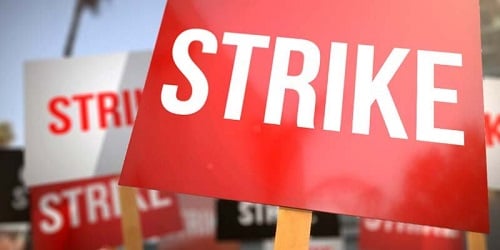Members of the University Teachers Association of Ghana (UTAG) are currently divided over a strike initiated by the National Executive Council. The strike, which began on October 11, was intended to push the government to take action against the rampant illegal mining activities known as galamsey. These activities have become a significant concern in Ghana, impacting both the environment and the economy. However, shortly after the commencement of the strike, a faction within UTAG calling themselves the ‘silent majority’ has emerged, expressing dissatisfaction with the ongoing action and calling for its immediate halt. This division highlights underlying tensions within the association regarding strategies to address the challenges posed by illegal mining.
The ‘silent majority,’ represented by spokesperson Prof. Isaac Boadi, has voiced their demands clearly and urgently. They are requesting that UTAG’s National Executive Council call off the strike by October 18, just a week after it began. Prof. Boadi emphasized the group’s desire for a swift resolution, indicating that they are eager to return to normal operations. Their main demand is for the leadership to reconsider the effectiveness of the strike, arguing that it may not be achieving the intended outcomes regarding government accountability for illegal mining. The group’s emergence suggests a significant shift in opinion among association members, driven by a practical approach to engaging with the issues at hand rather than continuing disruptive actions.
In advocating for their position, the ‘silent majority’ believes that instead of striking, UTAG should play a more active role in monitoring the government’s implementation of measures to combat galamsey. They propose the formation of a dedicated team within UTAG that would focus on overseeing the government’s roadmap for addressing illegal mining. This proactive stance reflects a desire not only to influence policy but also to ensure that the concerns that prompted the strike are adequately addressed through collaborative efforts rather than extended periods of inactivity. The idea of monitoring implementation aligns with their goal of accountability, ensuring that promises made by the government are fulfilled.
The context of the strike is critical, as illegal mining poses significant threats to Ghana’s natural resources and environmental sustainability. The government has often faced criticism for its insufficient action in dealing with this issue, which has ramifications for public health, land degradation, and water pollution. The initial decision to strike was a collective response from UTAG to escalate pressure on the government to take decisive steps. However, the evolving dialogue within the association suggests a reflection on the most effective methods for promoting sustainable change, as some members seek to balance advocacy with institutional responsibilities.
In the backdrop of these dynamics, the UTAG leadership faces the challenge of addressing the concerns raised by both the striking members and those advocating for a return to academic engagement. The division among the members could undermine the association’s unified front, which is often crucial for effective advocacy. It is essential for UTAG’s leaders to navigate these differing opinions and find a way to harmonize the group’s actions with the broader objectives of promoting responsible governance in matters related to illegal mining. The pressure from the ‘silent majority’ to reconsider the strike underscores the importance of inclusivity in decision-making within organizational structures.
As the deadline approaches for the response from UTAG’s National Executive Council, the implications of this internal conflict will likely resonate beyond the association itself. The discussions surrounding the strike and strategies for addressing illegal mining will have wider consequences for tertiary education institutions and potentially influence national policy debates. Ultimately, the association’s response to the ‘silent majority’ could redefine its role in advocating for environmental protection while fulfilling its academic mission. The evolving situation serves as a critical reminder of the need for open dialogue and collaborative efforts in tackling complex societal issues.














